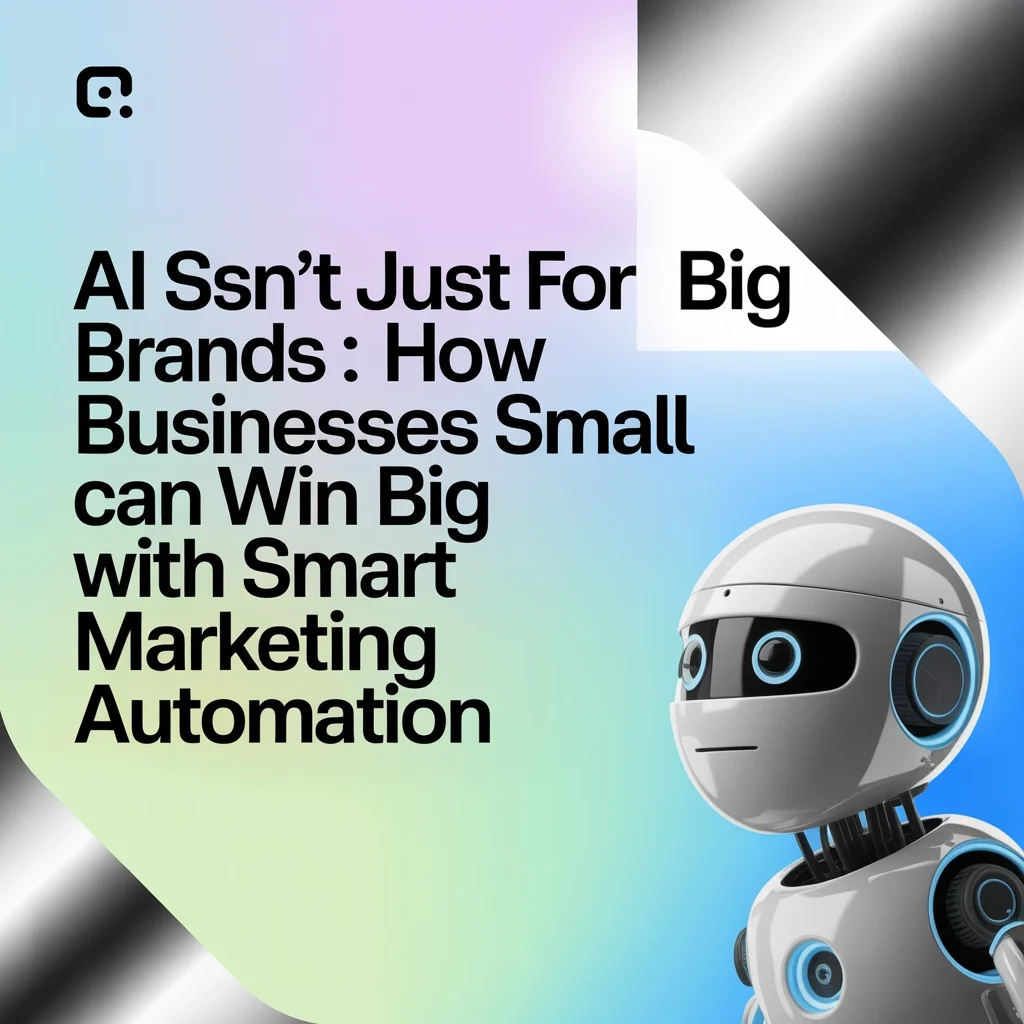Breaking the AI Myth: Small Business Edition
When most people hear "AI-powered marketing automation," they picture massive corporations with dedicated tech teams and bottomless budgets. That mental image couldn't be further from today's reality. The democratization of AI tools has created an unprecedented opportunity for small businesses to compete in ways that were impossible just a few years ago.
"The most exciting innovation happening with AI isn't in Fortune 500 companies—it's in small businesses finding creative ways to automate processes that previously required entire departments." — Ryan Deiss, Digital Marketer
As a small business owner, you've likely faced the classic dilemma: too many marketing tasks, too little time, and not enough hands on deck. The good news? AI-powered automation tools are now specifically designed with your constraints and needs in mind.
Why Small Businesses Actually Have the AI Advantage
Counterintuitively, small businesses often have structural advantages when implementing AI marketing tools:
- Agility: Smaller teams can adopt new tools without navigating corporate bureaucracy
- Focused data: Smaller customer bases mean more manageable datasets for personalization
- Customer relationships: You already know your customers personally, making AI insights even more powerful
- Resource optimization: When every hour counts, automation delivers outsized returns

5 Game-Changing Marketing Automation Opportunities for Small Businesses
1. Email Marketing That Actually Feels Personal
Forget the days of blasting the same generic newsletter to your entire list. Today's AI-powered email marketing platforms allow small businesses to create sophisticated customer journeys triggered by specific behaviors.
Tools like Mailchimp, ActiveCampaign, and HubSpot now offer small-business-friendly automation features that can:
- Send welcome series that adapt based on how subscribers engage
- Automatically segment customers based on purchase history
- Recommend products based on browsing behavior
- Re-engage dormant customers with personalized incentives
- A/B test subject lines to maximize open rates
Quick Win: Set up a simple abandoned cart sequence that sends 3 personalized follow-up emails, each with increasing urgency or incentive. Many small businesses see 10-15% recovery rates with minimal setup time.
2. Social Media: From Time-Sink to Strategic Asset
For small business owners, social media often feels like a necessary evil—important for brand awareness but a massive drain on limited time. AI-powered social tools can transform this dynamic completely.
Platforms like Buffer, Hootsuite, and Later now incorporate AI features that:
- Suggest optimal posting times based on when your specific audience is most active
- Recommend hashtags that will maximize reach for your particular content
- Generate caption variations to test different messaging approaches
- Identify trending topics relevant to your business
- Schedule content in batches to maintain consistent presence without daily attention
Quick Win: Use an AI caption generator like Lately.ai to turn one long-form piece of content (like a blog post) into dozens of social posts, saving hours of writing time while maintaining your brand voice.
3. Lead Generation & Qualification on Autopilot
Perhaps the most powerful application of AI for small businesses is in lead generation and qualification—turning your website from a digital brochure into a 24/7 sales assistant.

Modern chatbot platforms like ManyChat, Drift, and Intercom now offer affordable options specifically designed for small businesses that can:
- Engage website visitors with conversational prompts based on behavior
- Qualify leads by asking relevant questions based on page content
- Book meetings directly into your calendar without human intervention
- Answer common questions instantly, improving customer experience
- Route complex inquiries to the right team member
Quick Win: Set up a simple chatbot on your highest-traffic service page that asks 2-3 qualification questions before offering appropriate next steps (scheduling call, downloading resource, etc.). Even basic implementations typically increase lead capture by 30-40%.
4. Content Creation & Optimization That Scales
Content creation is consistently cited as one of the biggest challenges for small business marketing. AI tools have dramatically changed this landscape, making professional-quality content production accessible to businesses of all sizes.
Tools like Jasper, Copy.ai, and Frase now enable small businesses to:
- Generate blog post outlines based on competitive research
- Create first drafts of content that capture your voice and expertise
- Optimize existing content for SEO performance
- Generate variations for headlines, meta descriptions, and calls-to-action
- Create consistent content across multiple channels
"The future of content isn't about replacing human creativity but augmenting it. AI handles the heavy lifting so small businesses can focus on adding their unique perspective and expertise." — Ann Handley, MarketingProfs
Quick Win: Use AI to analyze your top-performing competitor's content, then create an improved version that covers similar topics but with your unique perspective and additional value. This approach often yields faster SEO results than starting from scratch.
5. Customer Insights That Rival Enterprise Analytics
Perhaps the most transformative aspect of AI for small businesses is access to customer insights that were previously available only to enterprises with dedicated data science teams.
Modern CRM platforms like HubSpot, Zoho, and even Salesforce's small business offerings now include AI-powered analytics that can:
- Identify patterns in customer behavior that predict future purchases
- Segment customers based on lifetime value potential
- Flag at-risk customers before they churn
- Recommend next-best actions for each customer interaction
- Personalize offerings based on predicted preferences
Quick Win: Set up automated tagging in your CRM to categorize customers based on purchase frequency, average order value, and recency. This simple segmentation allows for targeted communications that typically increase repeat purchase rates by 20-30%.

Starting Small: Your 30-Day AI Marketing Action Plan
The beauty of modern AI marketing tools is that you don't need to implement everything at once. Here's a practical 30-day plan for small businesses looking to dip their toes into marketing automation:
Days 1-7: Audit & Prepare
- Identify your biggest marketing time-drains
- Document your current customer journey
- Set clear goals for what success looks like
Days 8-14: Select & Setup
- Choose ONE area to automate first (email, social, etc.)
- Select a user-friendly tool with good support
- Set up your basic account and integrations
Days 15-21: Create & Launch
- Build your first simple automation
- Test thoroughly before going live
- Launch to a small segment of your audience
Days 22-30: Analyze & Optimize
- Review performance data
- Make refinements based on results
- Plan your next automation opportunity
Overcoming the Common Objections
If you're still hesitant about implementing AI marketing automation for your small business, consider these responses to common concerns:
"It's too expensive"
Most modern marketing automation platforms offer tiered pricing specifically designed for small businesses, often starting at $50-100/month—less than the cost of a few hours of contractor work.
"It's too complicated"
Today's tools are built for non-technical users, with drag-and-drop interfaces and templates designed specifically for small business use cases.
"It will feel impersonal"
Quality automation actually increases personalization by delivering the right message at the right time, rather than generic mass communications.
"I don't have enough data"
Even small customer bases provide valuable automation opportunities. In fact, starting with automation early helps you collect better data from the beginning.
Your Next Step: Start Simple, Think Big
The most successful small businesses don't try to implement every automation at once. Instead, they:
- Identify their most repetitive marketing task
- Find a user-friendly tool to automate that specific process
- Measure the time saved and results generated
- Reinvest that saved time into the next automation opportunity
This creates a virtuous cycle where each small automation creates capacity for more strategic work and further automations.
Ready to explore how AI and marketing automation can transform your small business marketing? Let's talk about your specific challenges and opportunities. Schedule a free strategy call to discuss which automation opportunities could deliver the biggest wins for your unique business.
Remember: AI isn't replacing the human touch that makes small businesses special—it's handling the repetitive tasks so you can focus more on the creative, strategic work that no algorithm can replicate.
Have you already implemented AI marketing automation in your small business? We'd love to hear your experience in the comments below!




No responses yet